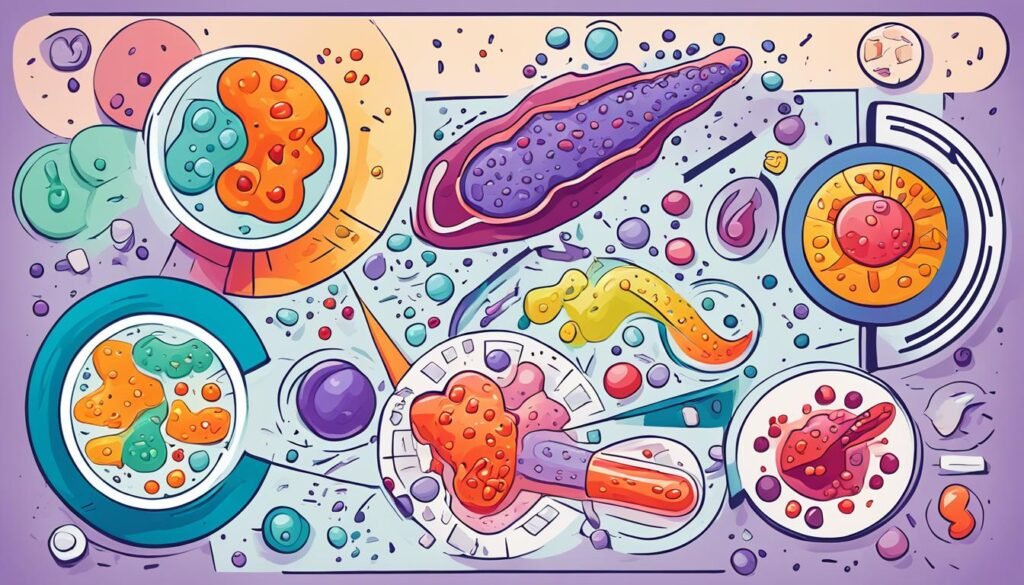Dealing with pancreatitis means considering many treatments. These help manage symptoms, avoid issues, and promote long-term health. This guide looks at the best medical, surgical, and lifestyle ways to treat both acute and chronic pancreatitis. By knowing these options, you can work with your healthcare team for a plan that fits your needs. This boosts your chances of getting better.
Table of Contents
ToggleIf you’ve just got pancreatitis symptoms or have chronic pancreatitis, there’s help. This guide covers how medical care, surgery, and lifestyle changes can benefit you. It shows you how to be active in your treatment for a healthier life.
Understanding Pancreatitis
Pancreatitis is a severe issue. It causes your pancreas to inflame. Your pancreas helps digestion by making enzymes. It also helps control sugar levels in the blood. Knowing the types, causes, and risks is key to dealing with this health problem.
What is Pancreatitis?
When your pancreas is inflamed, it’s called pancreatitis. It leads to pain and troubles with digestion. If not treated, it can cause serious problems. There are two main types: acute and chronic pancreatitis.
Types of Pancreatitis
Acute pancreatitis starts suddenly and is severe. It often gets better within a few days with the right care. Chronic pancreatitis is a long-term issue. It keeps damaging the pancreas over time.
Causes and Risk Factors
Many things can cause pancreatitis. These include gallstones, too much alcohol, and some drugs. Sometimes, we don’t know the exact reason. Risks include being obese, having high triglycerides, and some genetic conditions.

Knowing the types of pancreatitis and its causes is important. It helps you and your health team make a plan for you. This plan can help you manage pancreatitis well.
Medical Treatment for Pancreatitis
The first step in pancreatitis treatment is often a hospital stay. This is to control symptoms and avoid more problems. It may involve getting fluids through a vein, getting pain management for pancreatitis to reduce discomfort, and getting nutrition support for pancreatitis if you can’t eat. Doctors might also give you antibiotics if they think you have an infection. The main aim is to make you stable, give your pancreas a break, and help it start to heal.
Pain Management
Dealing with the pain is very important in pancreatitis care. Doctors may use different pain management for pancreatitis methods, like special medicines and nerve blocks. These help stop pain signals, making you feel better and able to concentrate on getting well.
Intravenous Fluids
Staying hydrated is key when managing pancreatitis. IV fluids for pancreatitis are usually given in the hospital. This way, they help with hydration and managing the sickness caused by pancreatitis.
Nutrition Support
Having the right nutrition for pancreatitis aids in healing. If eating is too difficult or causes more issues, you might get nutrients through a feeding tube or IV. Doctors and nutritionists will work with you to create a diet that speeds up your recovery.

Surgical Interventions for Pancreatitis
Sometimes, surgery is needed to deal with pancreatitis or its complications. A common procedure is ERCP, where a tiny camera tube is used to look inside the bile and pancreatic ducts. Doctors can spot and remove blockages like gallstones this way. If gallstones are causing your pancreatitis, you might need your gallbladder removed with a surgery called a cholecystectomy.
Endoscopic Retrograde Cholangiopancreatography (ERCP)
ERCP is a blend of an upper GI endoscopy and x-rays used to check and treat pancreatitis and other issues. The Pancreas Center excels in ERCP and other GI procedures across the nation.
Gallbladder Removal (Cholecystectomy)
Gallstones triggering pancreatitis might need a cholecystectomy, or gallbladder removal surgery. This surgery not only treats the problem but also stops it from happening again.
Pancreatic Duct Drainage and Debridement
If pancreatitis is severe or complex, draining fluid or removing damaged pancreas tissue is crucial. These actions aid in easing symptoms and avoiding more severe troubles.

pancreatitis treatment
The treatment of pancreatitis involves various methods. It might use medicine, surgery, and changes in how you live. The plan changes based on the pancreatitis type and its seriousness. In some cases, using painkillers, IV fluids, and changing your diet might be enough.
More complex issues might need surgery. This could be to fix the main problem or deal with complications. The overall goal of treatment is to lessen pain, stop more pancreas harm, and help you get better for the long term.
Treatments might include:
- Blood tests to check how the immune system and organs are working
- Imaging tests like ultrasound, CT scans, and MRI to check for problems
- Endoscopic procedures to find and take out gallstones
- Gallbladder surgery for pancreatitis caused by gallstones
- Surgeries to help with chronic pancreatitis
- Using enzymes to help digest in chronic pancreatitis
- Quitting alcohol and cigarettes, and changing your diet
People with pancreatitis work with their doctors to make a plan right for them. This helps them take better care of their health over time.

Lifestyle Modifications for Pancreatitis Management
In addition to medical and surgical help, making changes in how you live is key for pancreatitis care. These changes can help a lot and stop the condition from coming back.
Alcohol Abstinence
Stopping alcohol is a must for people with pancreatitis. Drinking more can make it worse and cause serious problems. If alcohol caused your pancreatitis, not drinking can protect your pancreas from more harm.
Smoking Cessation
It’s important to quit smoking if you have pancreatitis. Smoking makes the condition worse and raises the chance of getting pancreatic cancer. Quitting smoking is a big step for better health when you’re dealing with pancreatitis.
Dietary Changes
Eating a diet that’s low in fat but rich in nutrients is good for your pancreas. This diet takes stress off your pancreas and aids in proper digestion. Pick foods that are light on your pancreas like no alcohol, grease, or fried foods. This keeps you from getting sicker and helps with getting the nutrients your body needs.
Weight Management
Being at a healthy weight or losing extra weight is important. This prevents gallstones, which can cause pancreatitis. Too much weight raises the risk of gallstones.
With these lifestyle changes, you can get better and stay healthier. It protects your pancreas and lowers the chance of having pancreatitis again.
Chronic Pancreatitis: Ongoing Care
Living with chronic pancreatitis means you need ongoing care. To manage symptoms and risks, it’s crucial. Treatments like prescription drugs, nerve blocks, or procedures to help your pancreas work better can reduce the pain.
Enzyme replacement therapy with oral supplements also plays a key role. It helps your body digest food and absorb nutrients. This is important for anyone with chronic pancreatitis.
Pain Management Strategies
Chronic pancreatitis often causes severe and long-lasting pain. This can really change how you live your life. Doctors might give you various pain medicines, like opioids or NSAIDs. Other options include antidepressants and anticonvulsants to manage the pain.
If the pain is really bad, they might suggest nerve blocks or certain procedures. These can help you find relief.
Enzyme Replacement Therapy
One issue that can come with chronic pancreatitis is not having enough enzymes for digestion. This leads to problems like not being able to absorb nutrients well. Taking oral enzymes can make it easier to digest food. It helps with issues like diarrhea and pain, and it can even help you gain weight.
Diabetes Management
Chronic pancreatitis can also lead to diabetes. If your pancreas doesn’t make enough insulin, you need to manage your blood sugar well. This includes medication, watching what you eat, and checking your blood sugar often. Doing this can help avoid diabetes problems and keep you healthier overall.

Acute Pancreatitis: Preventing Recurrence
After an episode of acute pancreatitis, it’s crucial to find the cause and fix it. You might need to get rid of gallstones, stop drinking, or deal with medications that caused it. By finding and treating what caused your pancreatitis, you can lower the chance of it happening again.
Identifying and Treating Underlying Causes
Working with your healthcare team is key to stop pancreatitis from coming back. If gallstones caused it, a procedure might be needed to clear your ducts. For those whose pancreatitis came from drinking, staying sober is vital to avoid it happening again.
If the cause isn’t clear, more tests may be needed. These tests can find out if something wrong in your pancreas or ducts. Once they know what’s wrong, a treatment plan can be crafted to stop another attack.
Monitoring for Complications
After finding the cause, keeping an eye out for complications is just as important. Regular check-ups and tests can spot problems early. This includes finding pseudocysts or when the disease becomes chronic.
By working closely with your healthcare team and taking proactive steps, you can lower the chances of pancreatitis coming back. It’s important to stay committed to your health to prevent serious issues. Your dedication to care is vital for staying healthy.
Complementary and Alternative Therapies
Conventional treatments are the main way to handle pancreatitis. But, some people benefit from other methods. These include meditation and techniques for relaxation. They help reduce stress and improve overall health. This is important for those with pancreatitis and its chronic pain. Acupuncture, in particular, might ease pancreatitis pain.
Meditation and Relaxation Techniques
Adding meditation and relaxation methods can assist in dealing with pancreatitis. They cut down stress and foster inner peace. This aids in reducing the never-ending pain. Options to try are deep breathing, visualizing peaceful scenes, and tensing and relaxing various muscles.
Acupuncture for Pain Relief
Some studies back the idea that acupuncture helps manage pancreatitis pain. Acupuncture is from ancient Chinese medical practices. It puts thin needles at specific spots to increase the body’s healing energy, qi. While we don’t completely know how it works, acupuncture seems to cut down on inflammation and pain in pancreatitis cases.
Always talk with your doctor before trying new therapies for pancreatitis. This is to make sure they are safe and suitable for you. Working together with your healthcare team ensures a comprehensive and beneficial treatment strategy.
Pancreatitis in Special Populations
Pancreatitis can happen at any age. But, children and pregnant women need extra care. They face different issues in diagnosis and care.
Pancreatitis in Children
Research, like the one in Dig Liver Dis, shows more kids are getting pancreatitis. The methods to treat them are not the same as with adults. So, it’s crucial for doctors, parents, and other caregivers to work closely together. This way, they can give kids the best care they need.
Pancreatitis in Pregnancy
Dealing with pancreatitis when a woman is pregnant is tough. Doctors need to think about both the mom and her baby. They must watch closely to give care that’s safe and works well. Keeping an eye on how the disease advances is key to both the mom’s and baby’s well-being.
Complications and Associated Conditions
It’s important to know that pancreatitis is a serious health issue. If not treated well, it can cause many other problems. Knowing about these problems is key to staying healthy and avoiding worse effects.
Pancreatic Pseudocysts
Pancreatic pseudocysts are fluid-filled sacs caused by pancreatitis. They can lead to pain, bleeding, and infections if not treated. A successful treatment, called video-assisted retroperitoneal debridement, often works 90% of the time.
Exocrine and Endocrine Insufficiency
Chronic pancreatitis can cause exocrine and endocrine insufficiency. Exocrine insufficiency means not enough digestive enzymes are produced. Endocrine insufficiency leads to diabetes. About 72% of sterile fluid collections in acute pancreatitis do not need drainage. This shows how careful treatment and monitoring are crucial.
Pancreatic Cancer Risk
People with pancreatitis, especially chronic, have a higher risk of pancreatic cancer. Quick medical care is essential. For infected necrotizing pancreatitis, delaying treatment can lower survival rates by 30 percent.
It’s vital to watch out for and treat these pancreatitis complications quickly. Working with your healthcare team is crucial. This way, you can manage any issues that come up and aim for the best health outcomes.
Supportive Care and Quality of Life
Treating pancreatitis means helping you more than just physically. It’s about making your life better. You will get support for your emotions and mind to handle the condition’s stress and pain.
Emotional and Psychological Support
The mental effects of pancreatitis can be hard. Your team might suggest counseling or groups to face these. Working on your mood can boost how you deal with emotional support for pancreatitis and ease daily stress.
Pain Management Programs
Lessening pancreatitis pain is key. Your doctor might suggest a pain management for pancreatitis plan. This could involve meds, therapy, and other methods. Doing this helps you find the best way to handle the pain and or better in life.
Dietary Counseling
Eating right is vital with pancreatitis. A dietitian will craft a diet for pancreatitis just for you. This plan will help with digestion, ensure you get the right nutrients, and aid healing. Taking care of what you eat is a big step towards getting better pancreatitis supportive care and living your best life.
Conclusion
Pancreatitis is a complex condition. It needs a lot of different treatments. By working closely with your healthcare team, you can create a personalized pancreatitis treatment plan. This plan will fit your needs and help you live a healthy life.
There are many ways to treat pancreatitis. These include medicine, surgery, and changes to your daily life. You should play an active part in your treatment. This way, you can aim for the best results with your healthcare team.
Managing pancreatitis is a journey that doesn’t stop. With the right help and your commitment, you can make your life better. Keep learning, be active in your healthcare, and work with your team. This will be key in helping you to live well.
FAQ
What is pancreatitis?
What are the types of pancreatitis?
What causes pancreatitis?
How is pancreatitis treated?
What lifestyle changes can help manage pancreatitis?
How is chronic pancreatitis treated?
How can acute pancreatitis be prevented from recurring?
Can complementary and alternative therapies help with pancreatitis?
How does pancreatitis affect special populations like children and pregnant women?
What are the potential complications of pancreatitis?
How can supportive care improve the quality of life for individuals with pancreatitis?
Source Links
- https://www.niddk.nih.gov/health-information/digestive-diseases/pancreatitis/treatment
- https://www.mayoclinic.org/diseases-conditions/pancreatitis/diagnosis-treatment/drc-20360233
- https://columbiasurgery.org/pancreas/pancreatitis-treatments
- https://www.ncbi.nlm.nih.gov/books/NBK6932/
- https://emedicine.medscape.com/article/181364-treatment
- https://www.nhs.uk/conditions/acute-pancreatitis/treatment/
- https://nyulangone.org/conditions/pancreatitis/treatments/lifestyle-modifications-for-pancreatitis
- https://columbiasurgery.org/pancreas/pancreatitis-diet
- https://www.hopkinsmedicine.org/health/conditions-and-diseases/chronic-pancreatitis/chronic-pancreatitis-treatment
- https://www.aafp.org/pubs/afp/issues/2018/0315/p385.html
- https://www.ncbi.nlm.nih.gov/pmc/articles/PMC4258558/
- https://www.ncbi.nlm.nih.gov/pmc/articles/PMC8728419/
- https://www.stlukes-stl.com/health-content/medicine/33/000122.htm
- https://www.ncbi.nlm.nih.gov/pmc/articles/PMC9454414/
- https://www.ncbi.nlm.nih.gov/pmc/articles/PMC4194569/
- https://pancan.org/facing-pancreatic-cancer/living-with-pancreatic-cancer/managing-side-effects-palliative-care/
- https://www.ncbi.nlm.nih.gov/pmc/articles/PMC10603964/
- https://www.ncbi.nlm.nih.gov/pmc/articles/PMC6953950/
- https://www.ncbi.nlm.nih.gov/pmc/articles/PMC2886461/
- https://fg.bmj.com/content/10/3/292


